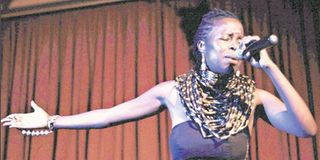Revolutionary tunes: You can’t stop the music

PHOTO | FILE | NATION
Sara Mitaru
Nothing drives a revolution’s point home better than music. Just ask Senegal’s veteran president Abdoulaye Wade whose attempt to cling to power is meeting fierce resistance from protesters inspired by the music of the influential rapper, Cheikh Oumar Cyrille Touré.
A succession of dictators in the Arab world, too, have been on the wrong end of the biting power of revolutionary tunes, none more so than the deposed Tunisian dictator Zine el-Abidine Ben Ali who was driven from power to the drumbeat of the sounds of Tunisian musician Hamada Ben Amor.
Music is one of the most powerful tools of articulating the discontent of the masses. If there is no music to express their sentiments, the masses always corrupt songs to suit their taste and run with it.
Africa, thanks to its history which has been marked by many revolutionary movements has been home to many singers who helped end colonialism or apartheid through their music. Singers like Femi Kuti, Miriam Makeba, Lucky Dube, Youssou N’Dour, Hugh Masekela and Angélique Kidjo feature in this cast.
Today, while there are not as many firebrand artistes as before, there are still musicians who won’t stop calling out politicians and powerful people who are clamping down on their people’s lives and future.
In Kenya, we have Eric Wainaina, Juliani, Kama (Kalamashaka) and Sara Mitaru among others.
Sara Mitaru believes music is one of the most powerful mediums out there and if well utilised, it has the power to oust unpopular regimes, right the wrongs in society and a lot more.
Indeed, not all music is about partying or expressing love. Yes, there is gospel but there is that kind of music that pierces your subconscious by stating something so poignant that is hard to resist.
Her song “Make way” is receiving good airplay on most of the major FM stations and while it is a danceable tune, if you pay close attention, you will find some really thought provoking lines.
“They say we’re independent but they won’t set us free/ They say we are sovereign but we’re shackled and chained/ They say the future is now but the past is with us/ They say we are tomorrow but we’re stuck in yesterday”
Sara says the song is a call to Africans to stop being complacent and stand up for their rights.
“We have this attitude in Africa that everything will sort itself out. We live through bad leadership and worse and we can’t do anything, it is time we demand our liberation,” she says.
She expresses that expertly.
“We won’t sit around we’ll fight for our rights/ they say you have trampled us enough is enough/ they say the future is now we leave behind the past/ they say we are tomorrow say goodbye to yesterday”
For Sara, this is not a call to arms, “Make way” is meant to prick the conscience of the masses and get them to demand better.
“This is music that gets you to think, it is not all about Kenya, no, anyone in Africa and across the world can relate to this music and I wanted to do a song that will still be relevant decades from today,” she says.
“People like Miriam Makeba wrote songs years ago but are still relevant today if you didn’t know better, you would think it was written for the current issues facing us as a continent.”
That ‘Make Way’ has generated a lot of reviews online and is being played on radio in Kenya and parts of Africa shows Sara that the people are listening.
“It is a milestone, if it wasn’t for the producers on the show, the show wouldn’t be where it is and I love the feedback I am getting,” she says.
Today, the music is well produced, well written and appeals to a wider audience thanks to the Internet.
“I released the music online first and the downloads and the number of times people listened to it was amazing,” says Sara. “People could associate with it and because it was appealing, the lyrics are easy to remember and sing along to.”
During the Arab Spring, music was without a doubt the soundtrack to the revolutions that ousted dictators, Zine al-Abidine Ben Ali, Hussein Mubarak and Muammar Gaddafi.
In Kenya, rapper Juliani says he uses his music to point out the issues but goes further to try and provide solutions.
“A friend told me that development is a conversation between the rich and the poor,” says Juliani. “Majority of the time, we blame politicians yet we are the ones who put them in power without knowing how to hold them accountable. People need to understand this.”
Music is a powerful medium and while it still has space for love and clubbing, it can also serve as the spark for revolutions.



